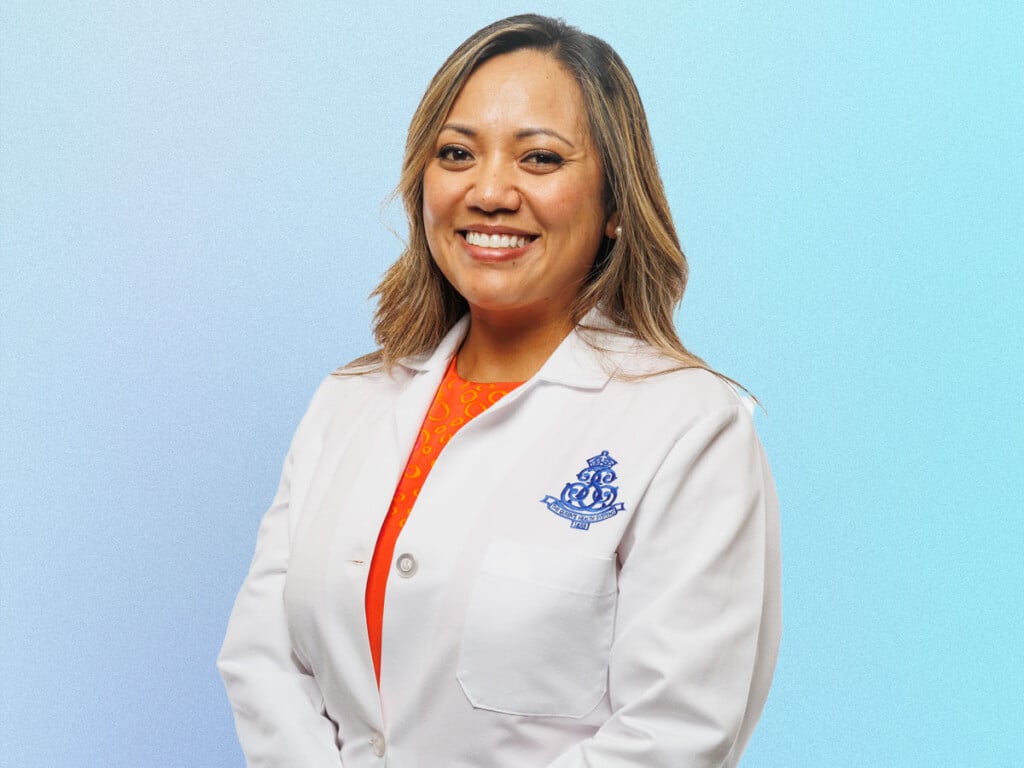Let’s Talk About Menopause
Misinformation about this natural life stage is rampant, and many women experiencing symptoms are brushed off and left to suffer in silence.

Photo: Getty Images; fcscafeine
Amber Vasquez is a healthy 58-year-old CrossFit coach, nutrition consultant and athlete who’s also on hormone replacement therapy to regulate the brain fog, hot flashes and crushing fatigue that began in her late 40s with the onset of menopause.
Vasquez didn’t struggle to talk about her symptoms with a doctor; she struggled to find a doctor who would listen. While in a good place now, the Hilo resident didn’t get the answers she was searching for easily. One OB-GYN she went to suggested she was a hysterectomy candidate and tried to convince her to stop hormone replacement therapy. “She got very combative,” Vasquez says. “I thought that was crap.”

Photo: Courtesy of Amber Vasquez
Dr. Stacy Ammerman, a board-certified OB-GYN with professional certifications in menopause care, keeps a journal in her Kahului office where she jots down the frustrating medical advice her patients received from previous doctors after seeking help for symptoms of menopause or perimenopause.
One entry: “When a middle-aged patient went to her doctor complaining of worsening anxiety, she was asked if she’d ever considered drinking a glass of wine at night to wind down.”
Another: “A woman with other symptoms of perimenopause noticed she was gaining weight without changes to her diet. The generally active woman was told she simply needed to work out more and eat less.”
“I have patients who have spilled their hearts out and been told it’s all in their heads,” says Ammerman, the founder of Pacific Menopause, a specialty online clinic that she operates separately from her full-time gynecological practice.
Ammerman, who readily volunteers that she’s experiencing perimenopause symptoms herself, says even doctors highly trained in the changes that women can undergo as they near or enter menopause are left stumped by some cases. She is a strong proponent of letting patients know when answers might take a while to find—and she stresses that symptoms can vary widely, change over time and require different approaches.
One thing Ammerman is certain about: When it comes to menopause, doctors need to start listening more—and stop brushing off complaints. “Women put up with more suffering than they need to,” she says. “Mood and sleep problems. Hot flashes. Brain fog. Vaginal dryness. Libido issues. A lot of women don’t even feel comfortable talking to their doctors about these things.”
SEE ALSO: What to Know About Gynecological Cancers
A Normal Stage of Life
For all the mystery, fear, ignorance and myth surrounding it, menopause is a natural biological stage for women in midlife. A woman officially enters menopause after not having a period for 12 months. In the U.S., the average age for when that happens is 51.
Perimenopause, meanwhile, can last for up to a decade before menopause and be characterized by a host of symptoms, both physical and emotional. During the transition into menopause, in addition to ovulation becoming irregular, a woman’s production of estrogen and progesterone decreases. It’s that drop in estrogen levels that’s responsible for many of the symptoms that perimenopausal and menopausal women experience.
While women make up more than half of the U.S. population, and the country is graying at a faster rate than it has in more than a century, research on perimenopause and menopause is woefully inadequate and underfunded, experts say. This persists even though about 85% of women experience menopause symptoms (hot flashes are, by far, the most common), according to the National Institutes of Health. And roughly a quarter of women describe their symptoms as severe—so disruptive that they impact their relationships, careers, ability to parent and day-to-day functioning, surveys have found. Worse, many primary care doctors, specialists and even gynecologists are poorly equipped to treat the symptoms, falling back on outdated assumptions and spotty training.
“Today, there are more women entering the menopause transition than at any other point in history, so researching new therapeutic options and educating women on menopause and ways to address bothersome symptoms needs to be a priority,” says Dr. Stephanie Faubion, medical director of The Menopause Society, an Ohio-based nonprofit that offers training to health care professionals and educational resources for women across the country. “The medical field, as a whole, has lagged in recognizing the enormity of this challenge, providing only limited training for health care professionals. Because most women will spend a third or more of their lives in menopause, we need to do a better job for them.”
Menopause: A New Priority
That “better job” could be on the horizon, thanks in part to a public outcry over the state of menopause care in the U.S. Amid a growing acknowledgment in medical circles that women’s health research has been neglected, menopause is getting new attention, including at medical schools, laboratories, hospitals, in the national media and even inside the halls of Congress. Over the summer, five prominent U.S. senators, including Senate Appropriations Committee Chairwoman Patty Murray, D-Wash., introduced bipartisan legislation that would funnel new federal dollars into menopause research.
Murray noted there are few federally funded clinical trials on menopause and menopausal hormone therapy and little menopause education for doctors—with less than 33% of U.S. residency programs offering menopause curriculums, according to one survey.
“We do need more studies. We do need more training. And patients need to advocate for themselves,” says Ammerman, who started her menopause clinic to offer women a place to ask frank questions and better understand treatment options.
Dr. Melissa Lawrence, an OB-GYN at Kaiser Permanente Hawai‘i with special training in menopause care, says that when women don’t receive substantive information and care from their doctors, they sometimes turn to social media for advice, support and even treatments. In worst-case scenarios, women are trying products that are not FDA-approved or doctor-recommended. One of those so-called treatments, she says, involves a pellet being injected into the skin to slowly release hormones, including estrogen, progesterone and even testosterone. “It’s dangerous because you can’t control the levels,” Lawrence says.
Is Hormone Replacement Therapy the Answer?
Further complicating the conversation are misconceptions about the risks and potential benefits of hormone replacement therapy, a course of action that women experiencing menopause symptoms are now urged to consider. Public misunderstandings about hormone replacement therapy largely stem from a major long-term study, known as the Women’s Health Initiative. In 2002, one part of the study that included clinical trials of women over 60 undergoing hormone replacement therapy was stopped early after subjects started experiencing adverse conditions, including blood clots, coronary heart disease and breast cancer.

Photo: Courtesy of Dr. Melissa Lawrence
After that, the number of women on hormone replacement therapy in the U.S. plummeted, from roughly 20% to about 4%, Lawrence says. In the years since, researchers have learned that hormone replacement therapy is safe to help balance estrogen levels and treat some symptoms, but should be prescribed within 10 years of those symptoms starting, and before age 60. Despite the new guidance, some doctors still won’t prescribe the therapy and actively discourage their patients from seeking it, Lawrence says.
While it’s not right for everyone and does carry some potential side effects, it can also lower other risks and dramatically improve quality of life for some women. “It’s important for people to come in and talk about it,” she says. She says in addition to hormone replacement, lifestyle changes—like eating right, getting enough sleep, managing stress, and exercising regularly—are critical too.
Menopause Is Personal
Ask 10 women in perimenopause and menopause what their symptoms are, and you’ll probably get 10 different answers. While some experience relatively mild symptoms, others have none, and still others struggle with everything from panic attacks to insomnia.
Danielle Perrault says perimenopause didn’t hit her like a ton of bricks, until it did. The 43-year-old started experiencing symptoms earlier than most, when she was 38. One of the first things she noticed: night sweats. “I was sweating out the bed every night, constantly changing the sheets, wasn’t sleeping well. I thought it was cancer,” says the Makawao business owner and mother of two girls. As months and years passed, more severe symptoms kicked in, including heart palpitations and hot flashes. Then came the anxiety, so severe at times that she couldn’t drive her kids to school or go to work. The anxiety got worse and worse—then the panic attacks started.
Perrault told her OB-GYN, who referred her to a cardiologist for the heart palpitations. She was instructed to try breathing exercises for her anxiety and was prescribed medication for the panic attacks. “It was a lot of different Band-Aids from a lot of different doctors,” Perrault says. And all the while, the symptoms persisted.

Photo: Courtesy of Danielle Perrault
Then one day, an older friend at the gym asked Perrault if she’d ever had her hormones tested. “It had never crossed my mind,” Perrault says. “I thought I was just losing my mind.” A short time later, on another friend’s recommendation, Perrault found Ammerman’s practice. After testing, she learned she was a good candidate for hormone replacement therapy. Her hot flashes disappeared within a week of starting the therapy, and while other symptoms remained, they were less frequent. Fewer panic attacks. Fewer night sweats. A more normal daily life.
In retrospect, Perrault says it’s clear she was experiencing perimenopause symptoms, but at the time she didn’t connect the dots—and neither did her doctors. “It often felt very scary. It was a major strain on my marriage; I was having two to three panic attacks a week,” she says.
Sarina Erstad of Hale‘iwa started experiencing hot flashes four years ago at 44, and the symptoms stacked up year after year: Brain fog, dry skin, itchy ears, joint pain, changes to her vision. “Last year, my hot flashes and night sweats got so bad that I had not slept through the night for over six months,” she says. “I had to change clothes several times a day because I was drenched.”
Hormone replacement therapy wasn’t an immediate option for Erstad because of a breast cancer diagnosis, but she was able to start it last year. Since then, she’s watched her symptoms abate. “Compared to my younger self, I now feel so much more relaxed and grounded. I guess you could say I’ve matured,” she says.
Even with all the public discourse on menopause, physicians say many women still struggle to discuss what they’re experiencing with their doctors. Instead, they say, they wind up delaying care, like Perrault did, until the symptoms disrupt their lives.
Dr. Richard McCartin, chief OB-GYN at Pali Momi Medical Center, says doctors should help their patients overcome that stigma by asking the right questions. “People don’t like to say, ‘Oh, I’m in menopause,’” he says. So instead, he might ask women if they’re experiencing pain during intercourse, a symptom of vaginal dryness, or urinary incontinence, a common symptom of menopause. “I try to normalize the conversation. … Incontinence is a big deal and there is an embarrassment that goes along with that,” he says. “But you try to explain it. This is a natural thing, just from aging and childbirth.”

Dr. Arlene Joy Baldillo. Photo: Courtesy of The Queens Health Systems
Arlene Joy Baldillo, a doctor of osteopathic medicine at The Queen’s Medical Center, stresses the importance of giving patients time and space to discuss their symptoms. “I like to discuss menopause when appropriate at annual exams,” she says. “It’s essential to set expectations, discuss various symptoms many of us can experience and recognize when further evaluation is warranted. … Navigating through menopause can be an empowering experience, one that may leave patients stronger, healthier and more fit than prior to the transition.”
Moving Forward
Vasquez, the Hilo resident and CrossFit coach, is now receiving care from both a doctor and naturopath and is tackling her menopause symptoms from multiple fronts. “I feel almost like my old self again after years of going through the motions. … Sometimes, it felt there was no answer in sight,” she says.
Her advice to women: Be your own advocate, question everything and trust your gut and your body.











